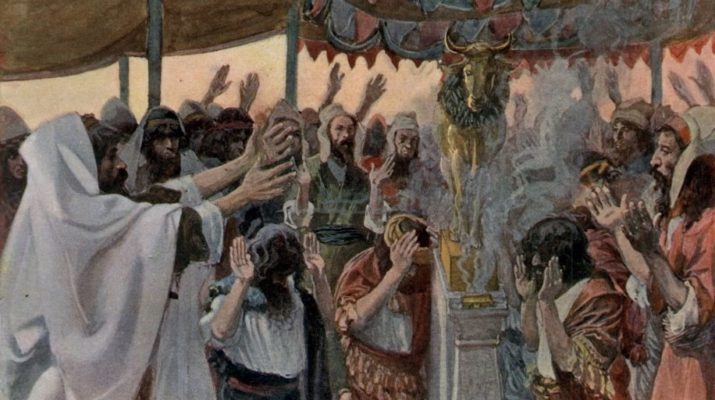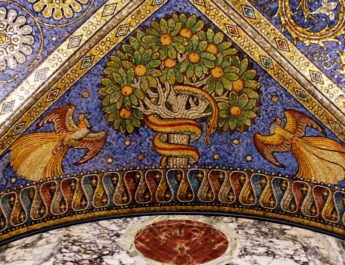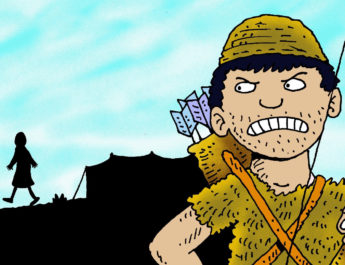Exodus 32:1-14
Ordinary A46
BibleHub
1 When the peopleA sawB that MosesC delayedD to come down from the mountain, the people gatheredE around Aaron,F
Notes on verse 1a
A “people” = am. From amam (to darken, hide, associate; creating shadows by huddling together). This is people or nation. It can be used specifically for a tribe, collectively of troops or armies, or figuratively to refer to a flock of animals.
B “saw” = raah. This is to see in a literal or figurative sense so stare, advise, think, view.
C “Moses” = mosheh. From mashah (to pull out in a literal or figurative sense, to draw out) OR from Egyptian mes or mesu (child, son i.e. child of…). This is Moses – the one drawn out from the water, which is to say, rescued. If derived from the Egyptian, his name would share a root with Rameses and Thutmose.
D “delayed” = bosh. Properly, this means to be pale, which implies shame, disappointment, or confusion.
E “gathered” = qahal. From qahal (assembly, congregation, multitude). This is to gather, convene, assemble like a congregation.
F “Aaron” = aharon. Derivation uncertain. May mean “bearer of martyrs” OR be related to Ancient Egyptian ꜥḥꜣ rw (warrior lion) OR elevated, exalted, high mountain. This is Aaron. See https://en.wiktionary.org/wiki/Aaron
and said to him, “Come,G make godsH for us, who shall goI beforeJ us;
Notes on verse 1b
G “come” = qum. To arise, stand, accomplish, establish, abide. This is rising as in rising against, getting up after being sick or asleep, arising from one state to another, becoming powerful, or rising for action. It can also be standing in a figurative sense.
H “gods” = elohim.
I “go” = halak. This is go, come, walk. It is walk literally and figuratively and includes people and animals. It can be used figuratively for one’s moral life – how we walk according to God’s way or against it. It can also refer to the walk of life as in the course one’s life takes, the choices we make, etc.
J “before” = paneh. From panah (to turn, face, appear). This is face in a literal or figurative sense. It could be face, presence, anger, respect. It can also be used of God to indicate divine favor or presence.
as for this Moses, the manK who brought us up out of the landL of Egypt,M we do not knowN what has become of him.”
Notes on verse 1c
K “man” = ish. Perhaps from enosh (human, humankind, mortal); from anash (to be weak, sick, or frail). This is man, husband, another, or humankind.
L “land” = erets. Root may mean to be firm. This is earth, ground, field land, or country.
M “Egypt” = mitsrayim. Perhaps from matsor (besieged or fortified place, bulwark, entrenchment; something hemmed in; a siege or distress or fastness); from tsur (to confine, besiege, to cramp). This is Egypt.
N “know” = yada. This is to know, acknowledge, advise, answer, be aware, be acquainted with. Properly, this is to figure something out by seeing. It includes ideas of observation, recognition, and care about something. It can be used causatively for instruction, designation, and punishment.
2 Aaron said to them, “Take offO the goldP ringsQ that are on the ears of your wives,R your sons,S and your daughters,T and bring them to me.” 3 So all the people took off the gold rings from their ears, and brought them to Aaron.
Notes on verses 2-3
O “take off” = paraq. 10x in OT. This is to tear apart, break off, drag away, or crunch. Figuratively, it can mean to deliver.
P “gold” = zahab. Root may mean to shimmer. This is gold or something that has the color of gold like oil. It can also refer to a clear sky – to good weather.
Q “rings” = nezem. 17x in OT. This is a ring worn for decorative reasons. It also includes earrings, nose rings, or other jewels.
R “wives” = ishshah. Related to “man” in v1. From ish (see note K above). This is woman, wife, or female.
S “sons” = ben. This is son, age, child. It is son in a literal or figurative sense.
T “daughters” = bat. Related to “sons” in v2. From ben (see note S above). This is daughter in a literal or figurative sense. It could also refer to a branch or a company.
4 He took the gold from them,U formedV it in a mold,W and cast an imageX of a calf;Y and they said, “These are your gods, O Israel,Z who brought you up out of the land of Egypt!”
Notes on verse 4
U “them” = yad. Literally “from their hand.” This is hand, ability, power. Hand in a literal sense, but also what one can do or the means by which one does it.
V “formed” = yatsar. Perhaps related to yatsar (to be narrow, distressed, or vexed); perhaps related to tsarar (to bind, restrict, narrow, be cramped, an adversary). This is to fashion or form, perhaps by squeezing something into a shape or form. Particularly, it is to create as a potter does. Figuratively, it is to determine.
W “mold” = cheret. 2x in OT. Perhaps more literally “formed it with a chisel.” This is any kind of tool used for engraving – a stylus, chisel, or pen.
X “image” = massekah. From nasak (to cover, pour out, offer; by analogy anointing a king). This is a pouring out or over. So it could be pouring molten metal to cast an image, making a libation (pouring out a drink offering), or otherwise covering.
Y “calf” = egel. May be from the same as agol (round, circular – root meaning revolve). This is a male calf as one that frisks about. Often used for one that is almost grown up.
Z “Israel” = yisrael. From sarah (to persist, exert oneself, contend, persevere, wrestle, prevail) + el (God or god). This is God strives or one who strives with God; new name for Jacob and for his offspring. This refers to the people and to the land.
5 When Aaron saw this, he builtAA an altarBB beforeCC it;
Notes on verse 5a
AA “built” = banah. This is to build, make, set up, restore, repair, or obtain children. It is to build literally or figuratively
BB “altar” = mizbeach. From zabach (to kill, slay, offer; slaughtering an animal to offer as a sacrifice). This is an altar.
CC “before” = paneh. Same as “before” in v1. See note J above.
and Aaron made proclamationDD and said, “TomorrowEE shall be a festivalFF to the Lord.”GG
Notes on verse 5b
DD “made proclamation” = qara. This is to call or call out – to call someone by name. Also used more broadly for calling forth.
EE “tomorrow” = machar. Perhaps from achar (to be behind, delay, be late, procrastinate, continue). This is tomorrow or later. It is some kind of deferred time, so it could also mean indefinitely or refer to the time to come.
FF “festival” = chag. From chagag (feast, celebrating a festival, making a pilgrimage; properly, going in a circle or marching in sacred procession; implies giddiness and dancing; reeling to and fro). This is a feast, a sacrifice as part of a festival, or the gathering of the festival.
GG “Lord” = YHVH. From havah (to be, become) or hayah (to come to pass, become, be). This is the name of the God of Israel, the self-existent and eternal one, the tetragrammaton. This pronunciation has been lost to time so “Lord” is generally used in its place.
6 They rose earlyHH the next day,II and offeredJJ burnt offeringsKK and broughtLL sacrifices of well-being;MM
Notes on verse 6a
HH “rose early” = shakam. This is leaning one’s shoulder into a burden or load, whether a person or an animal. Thus, it meant starting or rising early.
II “next day” = mochorat. Related to “tomorrow” in v5. From the same as machar (see note EE above). This is the next day or next morning.
JJ “offered” = alah. Same as “brought…up” in v1.
KK “burnt offerings” = olah. Related to “brought…up” in v1 & “offered” in v6. See note JJ above. This is to go up, approach, ascend, be high, be a priority; to arise in a literal or figurative sense.
LL “brought” = nagash. This is to draw, bring, or come near. It is approaching for any reason – as an attack on an enemy, in order to worship, to make an argument. It can also be used as a euphemism for sex.
MM “sacrifices of well-being” = shelem. From shalem (to make amends, finish, be safe, be friendly, to be complete or sound). This is a peace offering or a sacrifice of well-being. It was a voluntary offering given when one celebrated thanksgiving, alliance, or friendship.
and the people sat downNN to eat and drink, and rose upOO to revel.PP
Notes on verse 6b
NN “sat down” = yashab. This is to sit and so to remain and so to dwell. It is sitting for any reason – as a judge, in order to ambush, or just sitting quietly. Causatively, this can mean settling or marrying. This can also mean continue, endure, or establish.
OO “rose up” = qum. Same as “come” in v1. See note G above.
PP “revel” = tsachaq. 13x in OT. This is to laugh, mock, play, make sport. It is laughing out loud whether in joy or in a scornful way. This is the root of “Isaac.”
7 The Lord said to Moses, “Go down at once! Your people, whom you brought up out of the land of Egypt, have acted perversely;QQ 8 they have been quickRR to turn asideSS from the wayTT that I commandedUU them; they have cast for themselves an image of a calf, and have worshipedVV it and sacrificedWW to it, and said, ‘These are your gods, O Israel, who brought you up out of the land of Egypt!’”
Notes on verses 7-8
QQ “acted perversely” = shachat. This is to decay, spill, or mar. Figuratively, it can be to perish, destroy, utterly ruin. Here the verb is in Piel, which is reflexive. So this would be “the people have destroyed themselves.”
RR “quick” = maher. 18x in OT. From mahar (being liquid, which implies flowing; so, hurrying forward, whether in a positive or negative sense). This is speedy, quickly, soon, suddenly, or at once.
SS “turn aside” = sur. This is to turn aside in a literal or figurative sense – to depart, decline, rebel, remove, or withdraw.
TT “way” = derek. From darak (to tread, march, to walk. Can also mean affixing a string to a box since one needs to step on it to bend it in the process; so also an archer). This is a road as a thing that is walked on. Can be used figuratively for the path that one’s life takes or how one chooses to live one’s life.
UU “commanded” = tsavah. This is to charge, command, order, appoint, or enjoin. This is the root that the Hebrew word for “commandment” comes from (mitsvah).
VV “worshiped” = shachah. This is to bow down, make a humble entreaty, to do homage to royalty or to God.
WW “sacrificed” = zabach. Related to “altar” in v5. See note BB above.
9 The Lord said to Moses, “I have seen this people,XX how stiff-neckedYY they are. 10 Now let me alone,ZZ so that my wrathAAA may burn hotBBB against them
Notes on verses 9-10a
XX {untranslated} = hinneh. From hen (lo! Behold! If, though; an expression of surprise). This is to draw attention, show suddenness or surprise, or to emphasize the importance of the coming statement. See! Lo! Behold!
YY “stiff-necked” = qasheh + oreph. Qasheh is from qashah (to be fierce, cruel, dense, tough, severe). This is hard, severe, heavy, obstinate, hard-hearted. Oreph is the back of the neck – also used for stiff-necked. It is also used for the back more generally in a literal or figurative sense.
ZZ “let…alone” = yanach. Perhaps from the same as nuach (to rest, calm, camp, free, place, remain, satisfy, settle, station, or wait; implies settling down in a literal or figurative sense). This is to lay down, let alone, pacify, cast down, or deposit. It can also mean to allow something or someone to stay.
AAA “wrath” = aph. From anaph (to be angry; properly, breathing hard as a signifier of being enraged). This properly refers to the nose or nostril and by extension the face. It can specifically refer to anger or wrath as one breathes hard and nostrils flare in times of great anger.
BBB “burn hot” = charah. Perhaps related to charar (to be hot, burn, glow, melt, be scorched; figuratively, to incite passion, be angry). This is to be displeased, burn with anger, glow, become warn. Figuratively it is a blaze of anger, zeal, or jealousy.
and I may consumeCCC them; and of you I will make a greatDDD nation.”EEE
Notes on verse 10b
CCC “consume” = kalah. This is to end, be finished, complete, prepare, consume, spent, or completely destroyed.
DDD “great” = gadol. From gadal (to grow up, become great, become wealthy – to advance. The root meaning may be to twist in the sense of the process of growing). This is great, high, bigger, noble, old, marvelous. It can also refer to someone who is powerful or distinguished.
EEE “nation” = goy. From the same root as gevah (the back, person, or body); related to gev (among); related to gaah (to rise up). This is nation or people. Often used to refer to Gentiles or foreign nations. It can also be used figuratively for a group of animals. This is where the Yiddish “goy” comes from.
11 But Moses imploredFFF theGGG Lord his God,HHH and said, “O Lord, why does your wrath burn hot against your people, whom you brought out of the land of Egypt with great powerIII and with a mightyJJJ hand?
Notes on verse 11
FFF “implored” = chalah. Properly, this is to be worn; hence, being weak, sick, or afflicted. It can also mean to grieve or, positively, to flatter or entreat.
GGG {untranslated} = paneh. Literally “the face of” or “the presence of.” See note J above.
HHH “God” = Elohim. Same as “gods” in v1. See note H above.
III “power” = koach. Root may mean to be firm. This is power, strength, force. It can be literal or figurative, positive or negative. It can also mean capacity or means – what something produces. Additionally, it could refer to some kind of small reptile.
JJJ “mighty” = chazaq. From chazaq (to strengthen, seize, be courageous, repair, bind, heal, conquer, harden). This is strong, hard, powerful, loud, bold, violent, impudent. It is usually strong in a negative sense.
12 Why should the EgyptiansKKK say, ‘It was with evil intentLLL that he brought them out to killMMM them in the mountains, and to consume them from the face of the earth’?NNN
Notes on verse 12a
KKK “Egyptians” = mitsri. Related to “Egypt” in v1. From the same as Mitsrayim (see note M above). This is Egyptian.
LLL “evil intent” = ra’. From ra’a’ (to be evil, bad, afflict; properly, to spoil – to destroy by breaking into pieces; figuratively, to cause something to be worthless; this is bad in a physical, social, or moral sense; that which displeases, to do harm or mischief, to punish or vex). This is bad, disagreeable, that which causes pain, misery, something having little or no value, something that is ethically bad, wicked, injury, calamity. This refers to anything that is not what it ought to be – a natural disaster, a disfigurement, an injury, a sin.
MMM “kill” = harag. This is to strike with deadly intent so it can be kill, destroy, murder, or put to death.
NNN “earth” = adamah. From the same as adam (man, humankind); perhaps from ‘adom (to be red). This is ground, earth, soil as red, or land.
TurnOOO from your fiercePPP wrath; change your mindQQQ and do not bring disasterRRR on your people.
Notes on verse 12b
OOO “turn” = shub. To turn back, return, turn away – literally or figuratively. Doesn’t necessarily imply going back to where you started from. This is also the root verb for the Hebrew word for repentance “teshubah.”
PPP “fierce” = charon. Related to “burn hot” in v10. From charah (see note BBB above). This is burning anger, fierceness, or wrathfulness.
QQQ “change your mind” = nacham. Properly, this is a strong breath or a sigh. This can be to be sorry, to pity, console. Comfort, or repent. But, one can also comfort oneself with less righteous thoughts, so this can also mean to avenge oneself.
RRR “disaster” = ra’. Same as “evil intent” in v12. See note LLL above.
13 RememberSSS Abraham,TTT Isaac,UUU and Israel, your servants,VVV how you sworeWWW to them by your own self,
Notes on verse 13a
SSS “remember” = zakar. This is to remember, to mark something so that it can be recalled, to be mindful of, to mention.
TTT “Abraham” = Abraham. From the same as Abiram (exalted father, a high father – lofty) {from ab (father literal or figurative) + rum (rise, bring up, being high, extol, exalt, haughty; to raise in a literal or figurative sense)}. This is Abraham, father of many nations or father of a multitude.
UUU “Isaac” = yitschaq. From tsachaq (to laugh, mock, play, make sport; this is laughing out loud whether in joy or in a scornful way). This is Isaac, meaning “he laughs.”
VVV “servants” = ebed. From abad (to work, serve, compel; any kind of work; used causatively, can mean to enslave or keep in bondage). This is a servant, slave, or bondservant.
WWW “swore” = sheba. From sheba (seven, by sevenfold; it can also be used to imply a week or an indefinite number; symbolically, this is the number of fullness, sacredness, perfection). This verb, properly means to be complete – literally, to seven yourself. In terms of oath taking, this is to swear with the same seriousness as if you had declared the thing seven times.
saying to them, ‘I will multiplyXXX your descendantsYYY like the starsZZZ of heaven,AAAA and all this land that I have promised I will give to your descendants, and they shall inheritBBBB it forever.’”CCCC 14 And the Lord changed his mind about the disaster that he plannedDDDD to bring on his people.
Notes on verses 13b-14
XXX “multiply” = rabah. This is increasing in any aspect whether quantity, authority, size, quality, greatness, etc.
YYY “descendants” = zera. From zara (to sow or scatter seed; conceive or yield). This is seed or sowing. It can, thus, mean a fruit, plant, sowing time, child, offspring, or posterity.
ZZZ “stars” = kokab. Perhaps from the same as kavah (to prick, blister, burn, scorch). This is a star as shining, stargaze. Figuratively, can mean prince.
AAAA “heaven” = shamayim. Root may mean being lofty. This is sky, the air, or heaven. It is in a dual noun form so this might refer to the part of the sky where the clouds move on the one hand and the part beyond that where the sun, moon, and stars are on the other hand.
BBBB “inherit” = nachal. From nachalah (properly something that was inherited; can mean occupancy generally or, more particularly, an heirloom or an estate; can be an inheritance, gift, possession, or portion). This is to gain as a possession, divide for inheritance. Also, to occupy for any reason.
CCCC “forever” = olam. This is a long scope of time whether in the past (antiquity, ancient time) or in the future (eternal, everlasting).
DDDD “planned to bring on” = dabar + asah. Literally “said he would do.”
Image credit: “The Golden Calf,” as in Exodus 32:4, by James Tissot.




